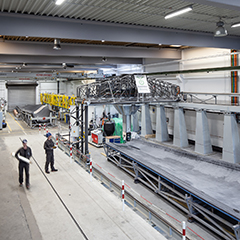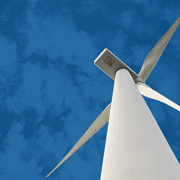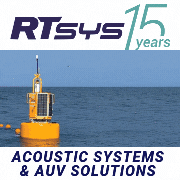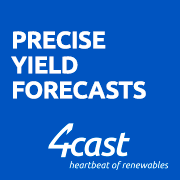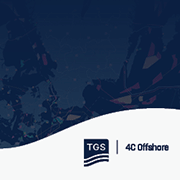Strategic collaboration in the field of rotor blade research
Two of the world’s leading institutions when it comes to wind energy, Danish DTU Wind Energy and German Fraunhofer Institute for Wind Energy Systems IWES have joined forces and national funded projects in the new €17.6 million RELIABLADE project creating a strategic collaboration to strengthen research collaboration and offer new innovative services to European industrial partners.
Developing rotor blades
For the project, researchers will develop a blade design for a 40 meter blade. This will serve as a blueprint for manufacturing two blades at Fraunhofer IWES and challenge them in experimental tests at the DTU in order to intentionally damage them under controlled conditions.
`We want to improve the understanding of the structural behavior of rotor blades. Therefore, we have developed a project in which we have control over the blade design, the manufacturing and the test and can investigate the damage process over the entire blade life with advanced numerical and experimental methods. This is truly unique in the wind turbine blade research and enables us to validate complex damage models,` explains project manager Florian Sayer from Fraunhofer IWES.
To cover a wide range of different damage modes, the two rotor blades for testing will encompass production errors such as inferior bond lines and damage in the composite or sandwich materials. The test blades will then be sent to the project partner DTU Wind Energy, where the behavior of the damaged parts will be assessed in a Full scale blade tests.
`The vision for the project is to develop methodologies for design, operation and maintenance of wind turbine rotor blades using a digital twin of every blade manufactured. We will then use this digital twin to follow the current state and predicting the future state of each blade during its entire life cycle using an automated condition monitoring approach,` explains project manager Kim Branner from DTU Wind Energy.
Improving structural reliability
The German and Danish project partners also plan on conducting subcomponent tests and developing fatigue models as well as damage prediction methods. With RELIABLADE, the project partners are making a decisive contribution to improve the structural reliability of rotor blades. That is important, as rotor blades constitute a large share of the turbine costs and their repair and service costs are relatively high. The results obtained will allow the industry to make progress towards improving cost-efficiency, cutting energy production costs and increasing its competitiveness internationally.
Facts German Project
– The German part of RELIABLADE is financed by the German Federal Ministry for Economic Affairs and Energy (BMWi) to the tune of €6.5 million
– The partners in the German project are Fraunhofer IWES and Leibniz University Hanover
– Contact: Florian Sayer, florian.sayer@iwes.fraunhofer.de
Facts Danish Project
– The Danish part of RELIABLADE has a total budget of €11.1 million and is supported by Energy Technology Development and Demonstration Program (EUDP) with €5.9 million
– The partners in the Danish project are DTU Wind energy, Vestas Wind Systems A/S, LM Wind Power A/S, IBM Denmark ApS, FORCE Technology, Siemens Industry Software NV (SISW), CEKO Sensors ApS, Dantec Dynamics GmbH, Blade Test Centre A/S (BLAEST), Zebicon A/S, Olsen Wings A/S and DTU Compute[RB1] [CB2]

